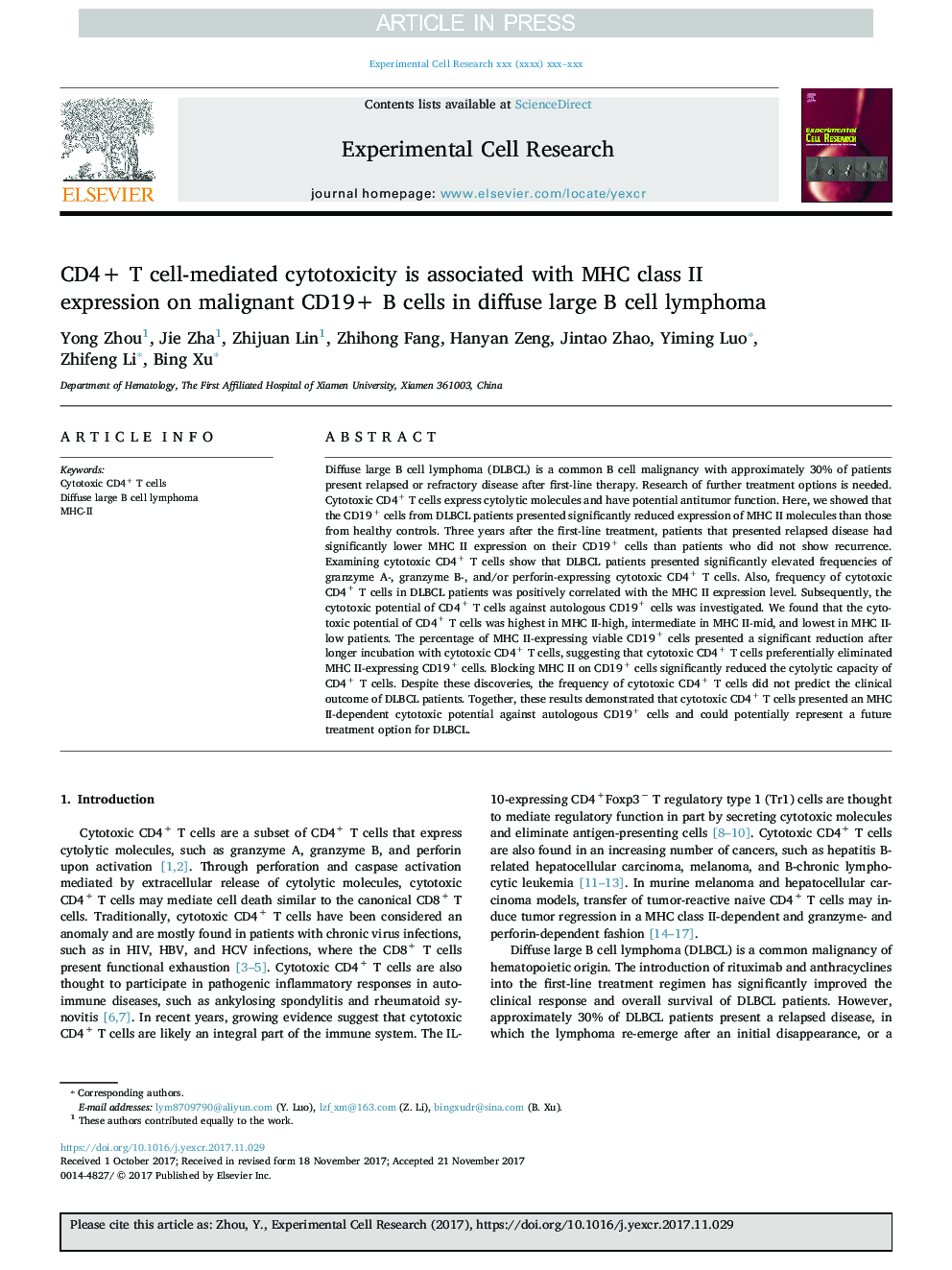| کد مقاله | کد نشریه | سال انتشار | مقاله انگلیسی | نسخه تمام متن |
|---|---|---|---|---|
| 8451538 | 1547696 | 2018 | 6 صفحه PDF | دانلود رایگان |
عنوان انگلیسی مقاله ISI
CD4+ T cell-mediated cytotoxicity is associated with MHC class II expression on malignant CD19+ B cells in diffuse large B cell lymphoma
دانلود مقاله + سفارش ترجمه
دانلود مقاله ISI انگلیسی
رایگان برای ایرانیان
موضوعات مرتبط
علوم زیستی و بیوفناوری
بیوشیمی، ژنتیک و زیست شناسی مولکولی
تحقیقات سرطان
پیش نمایش صفحه اول مقاله

چکیده انگلیسی
Diffuse large B cell lymphoma (DLBCL) is a common B cell malignancy with approximately 30% of patients present relapsed or refractory disease after first-line therapy. Research of further treatment options is needed. Cytotoxic CD4+ T cells express cytolytic molecules and have potential antitumor function. Here, we showed that the CD19+ cells from DLBCL patients presented significantly reduced expression of MHC II molecules than those from healthy controls. Three years after the first-line treatment, patients that presented relapsed disease had significantly lower MHC II expression on their CD19+ cells than patients who did not show recurrence. Examining cytotoxic CD4+ T cells show that DLBCL patients presented significantly elevated frequencies of granzyme A-, granzyme B-, and/or perforin-expressing cytotoxic CD4+ T cells. Also, frequency of cytotoxic CD4+ T cells in DLBCL patients was positively correlated with the MHC II expression level. Subsequently, the cytotoxic potential of CD4+ T cells against autologous CD19+ cells was investigated. We found that the cytotoxic potential of CD4+ T cells was highest in MHC II-high, intermediate in MHC II-mid, and lowest in MHC II-low patients. The percentage of MHC II-expressing viable CD19+ cells presented a significant reduction after longer incubation with cytotoxic CD4+ T cells, suggesting that cytotoxic CD4+ T cells preferentially eliminated MHC II-expressing CD19+ cells. Blocking MHC II on CD19+ cells significantly reduced the cytolytic capacity of CD4+ T cells. Despite these discoveries, the frequency of cytotoxic CD4+ T cells did not predict the clinical outcome of DLBCL patients. Together, these results demonstrated that cytotoxic CD4+ T cells presented an MHC II-dependent cytotoxic potential against autologous CD19+ cells and could potentially represent a future treatment option for DLBCL.
ناشر
Database: Elsevier - ScienceDirect (ساینس دایرکت)
Journal: Experimental Cell Research - Volume 362, Issue 2, 15 January 2018, Pages 287-292
Journal: Experimental Cell Research - Volume 362, Issue 2, 15 January 2018, Pages 287-292
نویسندگان
Yong Zhou, Jie Zha, Zhijuan Lin, Zhihong Fang, Hanyan Zeng, Jintao Zhao, Yiming Luo, Zhifeng Li, Bing Xu,